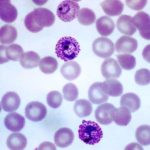 In 1927, Austrian physician Julius Wagner-Jauregg won the Nobel Prize in Physiology or Medicine for his discovery of the therapeutic value of malaria inoculation in the treatment of dementia paralytica associated with neurosyphilis infection.
In 1927, Austrian physician Julius Wagner-Jauregg won the Nobel Prize in Physiology or Medicine for his discovery of the therapeutic value of malaria inoculation in the treatment of dementia paralytica associated with neurosyphilis infection.
In the early 20th century, before the discovery of antibiotics, Dr. Jauregg’s treatment regimen—commonly called malariotherapy—was used to treat patients suffering from the syphilis bacteria Treponema pallidum. He inoculated patients with treatable species of malaria (Plasmodium vivax), as the extreme fevers associated with parasite infection were enough to kill the heat-sensitive bacteria. While close to 15% of patients died from the malaria infections, at the time this treatment course was deemed preferable to the almost-certain death from syphilis.
Now, a study led by scientists from National Institute of Allergy and Infectious Diseases (NIAID), part of the National Institutes of Health (NIH) and the Centers for Disease Control and Prevention (CDC) found that people infected with Ebola virus were 20% more likely to survive if they were co-infected with malaria-causing Plasmodium parasites. Moreover, higher parasitemias (percentage of parasites in the blood) correlated with increased rates of Ebola survival. Though the scientists are not advocating deliberate infections with malaria as Dr. Wagner-Jauregg did, they are hopeful that their study will open up much-needed avenues of research in dealing with highly virulent microbial pathogens such as Ebola.
The findings from this study were published recently in Clinical Infectious Diseases in an article entitled “Plasmodium Parasitemia Associated With Increased Survival in Ebola Virus–Infected Patients.”
At a joint diagnostic laboratory, established in Liberia by the NIH and the CDC, the scientists tested 1868 blood samples—taken from individuals seeking care for possible Ebola virus infection at the Médecins Sans Frontières ELWA3 Ebola treatment unit in Monrovia. Testing confirmed Ebola virus infection in 1182 samples, of which 956 were tested for Plasmodium parasites, resulting in 185 positives.
Amazingly, 58% with co-infections survived, compared to 46% who were infected with Ebola virus alone. Furthermore, those with the highest parasitemia levels showed an 83% survival rate.
Antimalarial drugs were routinely administered to all patients seen at the treatment unit during the Ebola outbreak. However, the investigators claimed that it had no bearing on the increased survival in Plasmodium-infected patients in the study. This evidence was supported by separate experiments conducted in the U.S., where treatment with antimalarials did not affect survival in laboratory mice infected with Ebola virus.
The research team is now in the process of pinpointing a mechanism that could explain the association between Plasmodium infection and surviving an Ebola infection—with the hope of uncovering new treatment modalities.
“Plasmodium species parasitemia is associated with an increase in the probability of surviving Ebola virus infection,” the authors concluded. “More research is needed to understand the molecular mechanism underlying this remarkable phenomenon and translate it into treatment options for Ebola virus infection.”

















